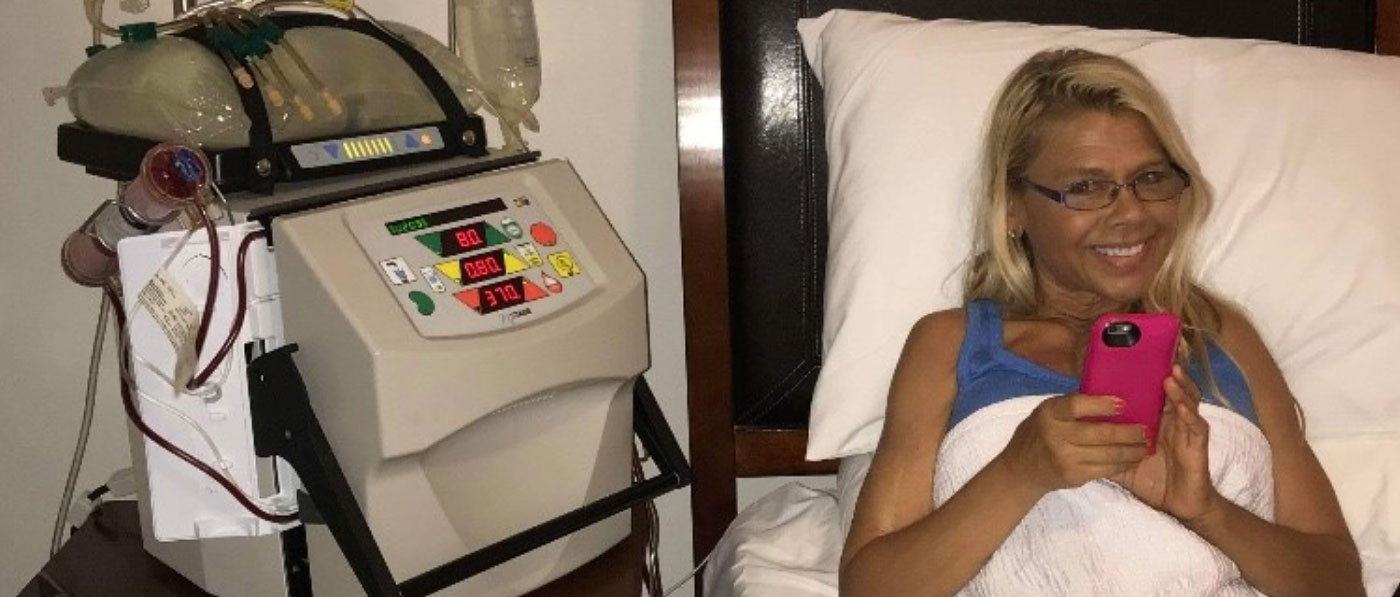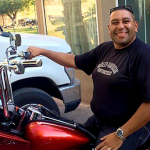Emotional Wellness Isn’t a State of Mind — It’s a State of Being
Just Ask Brielle, a Dialysis Patient of More than 30 Years
When thinking about end stage kidney disease and dialysis, we tend to focus on physical outcomes such as fluids cleared, blood pressure, cardiovascular health, dry weight, etc. But with its responsibilities, time constraints, and health concerns, being on dialysis can affect your emotions and mental state as well. It’s important to recognize when you’re feeling anxious, mentally worn, or depressed, and look for ways to take care of yourself.
If anyone knows the stresses of dialysis and the importance of emotional health, it’s Brielle. When she was 9, she lost her mother. At age 13, she lost her kidney function and began dialysis. Now, at 44, Brielle isn’t just a survivor, she’s a success story. Despite difficult times, she’s found ways to live and be at her best — discovering a dialysis therapy that fits her lifestyle, starting a business, traveling, and taking time for family, friends, and self.
“Emotional wellness, to me, means I’m balanced,” says Brielle. “If I feel a little off, I recognize it and do something about it. That might mean getting exercise, going to bed early, taking a nice bath, or hanging out with friends and just letting my hair down.”
For Brielle, feeling “a little off” started at birth. She was born with Vesicoureteral reflux (VUR), a condition that sends urine backwards into the kidneys. When it’s caught early enough, VUR can be treated with medication or surgery, but Brielle wasn’t diagnosed until age 12 and over the years her kidneys began to fail.
At 13, just months after starting dialysis, Brielle received a kidney donation from her father. The new kidney failed, however, as did one donated by her brother a few years later. So, for the better part of 21 years, Brielle did in-center hemodialysis (ICHD) at a nearby clinic. Although decades younger, she fit in great with her fellow in-center patients — something she owes to “being an old soul.” Treatments, however, did not always agree with her.
“It felt like I was running a marathon, and not in a good way,” Brielle recalls. “My pulse was high, and my blood pressure was usually really low. I felt miserable and being in the chair made me anxious too. I had to take medication to help me with that.”

When she felt well enough, Brielle worked out to stay physically and mentally healthy. She became a fixture at her gym, and even entered a bodybuilding show in her twenties.
“I disciplined myself and watched my diet and fluids,” says Brielle. “I just I wanted to see what it would be like — if I could get up on that stage and do it. I actually won second place!”
Whether lifting weights, riding a spinning cycle, or walking, exercise was always something that helped her feel good. And in 2011, Brielle did something that brought a new sense of wellbeing. She started training for more frequent home hemodialysis (HHD).
“Even before I finished training, I noticed the difference between HHD and ICHD,” Brielle remembers. “Instead of feeling anxious the whole time I had a nice conversation with my nurse. And I felt so much better during treatments and after coming off the machine.”
In the past, Brielle’s friends would motivate her to hit the gym, but since starting HHD, she’s become the ringleader.
“Now I’m the one telling them ‘Come on guys, let’s go! We can do this!”’ Brielle says with enthusiasm.

Brielle combined her love of fitness with a passion for pooches by starting a successful dog-walking service. She loves her job and says the dogs help lift her spirits, especially Chui, her Chihuahua and emotional support animal.
“He is such a good boy and lays nearby whenever I do dialysis,” says Brielle. “When I’m done, he’s right there waiting for me. He has gotten me through so much, especially when my late husband passed.”
As loyal as Chui is, Brielle takes time to have fun with human friends whenever she has the chance and believes being young at heart is one of the keys to staying positive.
“I was miniature golfing with one of my best friends, Beau,” she explains. “We were like little kids. We both got a hole in one and were screaming with excitement and everybody was looking at like us like, ‘Oh my gosh, these are grown women!’ But we didn’t care. We were having fun!”

Another way Brielle embraces life (and her family) is by traveling, something she says is much easier with a portable HHD machine.
“My sisters, my stepmom, and I were supposed to take a cruise, but when COVID-19 came along we had to cancel,” Brielle remembers. “So instead, we took my NxStage HHD machine to Berkeley Springs, West Virginia, and rented a secluded cabin. It was beautiful. The leaves were changing, and we made a campfire every night. At night, I would set up the machine for my treatment and we’d put a movie on and laugh together. It was just amazing.”
When she’s not on vacation deep in the woods, Brielle still takes time to be outdoors, in nature, to raise her sprits and give her a sense of peace.
“Even as a kid, I could lose myself in nature,” she says. “I would wander outside and just keep myself busy with my imagination. It uplifts me.”

As much as she craves activity, Brielle says there are times when a few words are enough to bring her comfort and self-worth. In the morning, she reads inspirational quotes or messages for reassurance. She also writes a list of things she is grateful for.
“It seems like the day goes a little bit better when I do that,” says Brielle.
Before bed, Brielle spends time journaling, and lately her favorite subjects are the people she meets as a NxStage Patient Advocate.* In this role, Brielle travels to dialysis centers and other locations and talks to patients about her experiences on HHD.
“I write about the patients that stand out to me and give me that rewarding feeling, or if I feel like I’ve really helped someone I’ll write about that,” says Brielle. “I’m so grateful for the experience.”
Brielle says she loves sharing the benefits of more frequent HHD and how they contribute to her emotional and overall wellness. Sometimes it takes time for patients to feel comfortable talking, but once they hear her story they often open up.
“I tell them I’m a patient and they look at me, like, huh?” Brielle explains. “Then I talk about how I was in-center for 21 years until I made the switch to HHD. That’s when the ball starts rolling and they begin talking to me. The nurses and patient technicians can all sympathize with them, but I can empathize, because I’ve been in that chair.”
October is Emotional Wellness Month, a time to think about your emotional state or that of friends, family, and others. This is especially critical as we deal with the effects of the COVID-19 pandemic. Poor mental health can put you at higher risk for other chronic health problems, including stroke, heart disease, and cancer.1 There are many resources available to help guide you through the emotions that can come with kidney failure and dialysis.
- The National Kidney Foundation (NKF) offers tips and facts to help patients and families cope with kidney failure and treatments.
- The American Kidney Fund has a page dedicated to mental health information and resources. The Dialysis Patient Citizens Education Center provides guidance and advice on emotional wellness.
- The Dialysis Patient Citizens Education Center provides guidance and advice on emotional wellness.
- The CDC’s Mental Health web page includes articles, links to helpful organizations, and a step by step guide to help you figure out how you’re feeling and ways to cope and get assistance.
If you’re feeling stressed, anxious, or depressed, don’t forget that your care team is always there to support you. Speaking with a social worker, nurse, or doctor could help get you back on track.
1. “Mental Health Quiz”. 2021. Cdc.Gov. Available at: https://www.cdc.gov/ mentalhealth/quiz/index.htm. Accessed 22 September 2021.
*NxStage Patient Advocates are compensated for their time.
Home hemodialysis with NxStage systems involves risks, and you may not experience the potential benefits of such therapy. NxStage systems require a prescription for use. If your doctor prescribes more frequent therapy, your vascular access is exposed to more frequent use which may lead to access related complications, including infection of the site.





